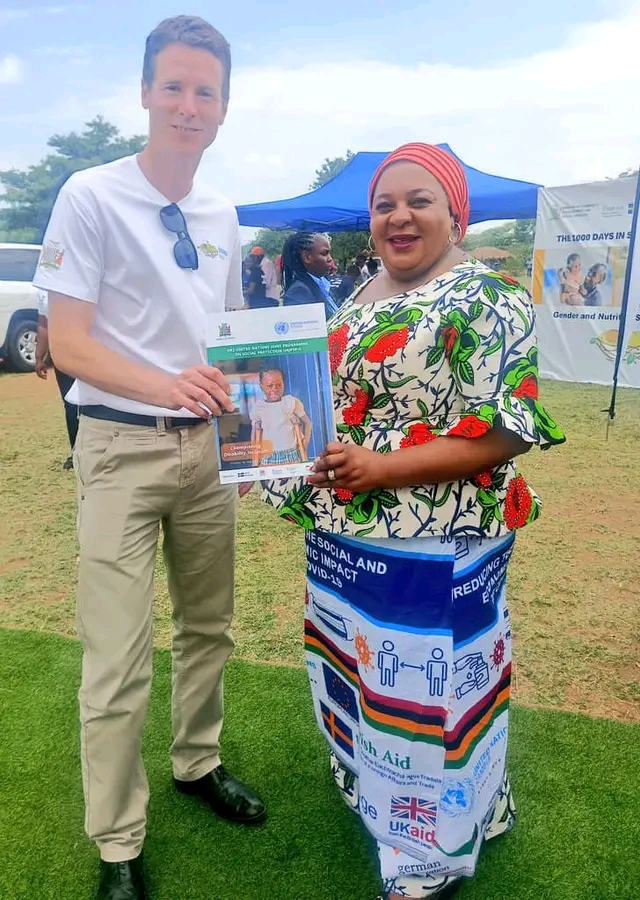THE United Kingdom (UK) has announced ar injection of £7 million (K207 million) into the Social Cash Transfer (SCT) to help Zambia’s poorest citizens to adapt to climate shocks.
Community Development and Social Services Minister Doreen Mwamba also said the Government intended to increase the number of beneficiaries on SCT from 1.3 million to 1.4 million.
British High Commissioner to Zambia Nicholas Woolley said at the launch of 1,000 Days in SCT held at Mashanga Village in Chipata yesterday, that this would further boost the existing financial support it would provide for Social protection in Zambia through the World Bank and the United Nations (UN).
Mr Woolley said Ireland, Germany, Switzerland, Sweden and the UK working with the UN would remain steadfast in their support of the initiative.
He said this would help respond to the climate shocks adding that the funds had come at the right time when global leaders were meeting in Dubai this week to begin importart climate change negotiations at COP28.
Mr Woolley said more than two million people would likely experience food insecurity.
“The Zambian Government and partners will continue to find pathways to mitigate the effects of climate change in communities where food security and nutrition gains are under threat and by growing chronic poverty,” he said.
And Ms Mwamba praised cooperating partners including the UN agencies and the World Bank, whose unwavering dedication and vision have made the 1,000 days SCT nutrition pilot initiative possible.
The minister said the pilot programme was designed to provide targeted financial assistance to vulnerable families ensuring that they have the means to access nutritious food and essential healthcare services, by directly addressing the economic barriers that contribute to malnutrition.
She said the pilot focuses on the first 1,000 days of life that was from conception until when the child was 24 months old.
“We aim to break the intergenerational transfer of poverty and improve the overall well-being of our citizens,” she said.
Ms Mwamba said this was a crucial period in which nutrition was vital to ensure optimal child development.
She said since October 2022, the pilot has been providing cash transfers plus other nutrition and health services to about 12,500 households across four pilot districts namely Chipata, Kalabo, Mpika and Mwinilunga.
Eastern Province Minister Peter Phiri said the Government has outlined its long-term development vision in the Vision 2030 and translates the vision through its five-year National Development Plans (NDPs).
The current Eighth National Development Plan (8NDP) and Vision 2030 make up the guiding macro- level policies aimed at transforming Zambia into a “Prosperous Middle-Income nation by 2030”.
He said this was in line with both the Vision 2030 and 8NDP, Government was implementing a number of key social protection programmes in the province through the Ministry of Community Development and Social Services.
“These are Social Cash Transfer, public welfare assistance scheme, ending child marriage, emergency cash transfers, single window initiative and the 1,000 days Social Cash Transfer nutrition pilot,” he said.
UN representative coordinator Beatrice Munthali who was represented by UNICEF deputy Representative Operations Henri Heikura said research had indicated that good nutrition in the first 1,000 days was vital to establishing a child’s future health, with impacts that last into adulthood.
She said unfortunately, most children in Zambia face multiple overlapping deprivations that prevent them from reaching their full potential.
Ms Munthali said the recent ZAMSTATS Poverty Assessment Report indicates that 70 per cent of the children in Zambia were multi-dimensionally poor meaning they suffer from deprivations in two or more dimensions of wellbeing simultaneously.
“Other national statistics also indicate that 32 per cent of children under the age of five are stunted and 50 per-cent of children under the age of five years are anaemic,” she said.








